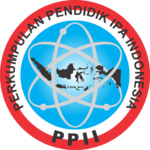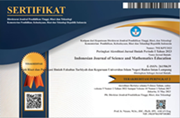Teachers' Perceptions of Physics Scientific Argumentation Test Instruments Based on Modern Test Theory Using Question Modeling Through E-Learning Edpuzzle LMS
Abstract
Keywords
Full Text:
PDFReferences
I. W. Redhana, “Menyiapkan Lulusan FMIPA yang Menguasai Keterampilan Abad XXI,” Proc. Semin. Nas. FMIPA UNDIKSHA V, vol. V, no. 1, pp. 138–155, 2015.
A. R. Saavedra and V. D. Opfer, “Learning 21st-century skills requires 21st-century teaching,” Phi Delta Kappan, vol. XCIV, no. 2, pp. 8–13, 2012.
D. Clark et al., “Online learning environments, scientific argumentation, and 21st century skills,” in E-Collaborative knowledge construction: Learning from computer-supported and virtual environments, vol. I, no. 2, pp. 1–39, 2010.
H. A. Yacoubian and R. Khishfe, “Argumentation, critical thinking, nature of science and socioscientific issues: a dialogue between two researchers,” Int. J. Sci. Educ., vol. XL, no. 7, pp. 796–807, 2018.
R. Katsh‐Singer, K. L. McNeill, and S. Loper, “Scientific argumentation for all? Comparing teacher beliefs about argumentation in high, mid, and low socioeconomic status schools,” Sci. Educ., vol. C, no. 3, pp. 410–436, 2016.
A. Betari, A. Hasanati, F. Fuadah, M. T. Amir, and P. Parno, “Students’ Learning Motivation through the Quality of Scientific Argumentation Skills and Students’ Cognitive Learning Outcomes on Newton’s Laws: A Relationship Analysis,” J. Ilm. Pendidik. Fis. Al-BiRuNi, vol. X, no. 1, pp. 71–84, 2021.
O. S. Mubarok, M. Muslim, and A. Danawan, “Pengaruh model pembelajaran berbasis masalah dengan pendekatan saintifik terhadap kemampuan argumentasi ilmiah siswa SMA pada materi pengukuran,” in Prosiding SNPS (Seminar Nasional Pendidikan Sains), vol. III, no. 3, pp. 381–388, 2016,
R. E. Putri, “Meningkatkan kemampuan argumentasi ilmiah siswa SMP Kelas VII melalui bahan ajar IPA terpadu dengan tema HALO pada topik kalor,” SEMESTA J. Sci. Educ. Teach., vol. I, no. 1, pp. 34–46, 2018.
M. Aydeniz and Z. Ozdilek, “Assessing Pre-Service Science Teachers’ Understanding of Scientific Argumentation: What Do They Know about Argumentation after Four Years of College Science?.,” Sci. Educ. Int., vol. XXVI, no. 2, pp. 217–239, 2015.
B. B. Frey, J. D. Ellis, J. A. Bulgreen, J. C. Hare, and M. Ault, “Development of a Test of Scientific Argumentation.,” Electron. J. Sci. Educ., vol. 19, no. 4, p. n4, 2015.
A. Fauziah, E. F. D. Sobari, and B. Robandi, “Analisis pemahaman guru sekolah menengah pertama (smp) mengenai asesmen kompetensi minimum (AKM),” Edukatif J. Ilmu Pendidik., vol. III, no. 4, pp. 1550–1558, 2021.
M. A. Fauzi, “E-learning in higher education institutions during COVID-19 pandemic: current and future trends through bibliometric analysis,” Heliyon, vol. VIII, no. 5, pp. 1-10, 2022.
F. Alfarisa and D. N. Purnama, “Analisis butir soal ulangan akhir semester mata pelajaran ekonomi SMA menggunakan Rasch model,” J. Pendidik. Ekon. Undiksha, vol. XI, no. 2, pp. 366–374, 2019.
N. Sudjana, Metode Statistika Edisi keenam. Bandung : PT. Tarsito, 2005.
V. S. G. Silverajah and A. Govindaraj, “The use of Edpuzzle to support low-achiever’s development of self-regulated learning and their learning of chemistry,” in Proceedings of the 10th International Conference on Education Technology and Computers, vol. X, no. 3, pp. 259–263, 2018.
D. Eliana and S. Admoko, “Tren Pembelajaran Argumentasi Berbasis Toulmins Argument Pattern (TAP) dalam Meningkatkan Kemampuan Argumentasi dan Pemahaman Konsep Fisika Peserta Didik,” Inov. Pendidik. Fis., vol. IX, no. 2, pp. 246–255, 2020.
M. I. S. Nasution, H. S. D. Lubis, Y. Tanjung, and A. A. B. Nasution, “Development of Infographic-Based Minimum Competency Assessment Instruments For High School Students In Medan City,” Int. J. Educ. Res. Soc. Sci., vol. II, no. 6, pp. 1439–1450, 2021.
D. Darmaji, A. Astalini, D. Dwi Agus Kurniawan, R. Perdana, and D. S. Putra, “A Study Relationship Attitude Toward Physics, Motivation, and Character Discipline Students Senior High School in Indonesia,” Int. J. Learn. Teach., vol. II, no. 1, pp. 1-9, 2019.
N. S. Galugu and S. Samsinar, “Academic self-concept, teacher’s supports and student’s engagement in the school,” J. Psikol. Pendidik. Konseling Vol, vol. V, no. 2, pp. 141–147, 2019.
DOI: http://dx.doi.org/10.24042/ijsme.v6i3.18991
Refbacks
- There are currently no refbacks.
Copyright (c) 2023 Unit Riset dan Publikasi Ilmiah FTK UIN Raden Intan Lampung

This work is licensed under a Creative Commons Attribution-ShareAlike 4.0 International License.

Indonesian Journal of Science and Mathematics Education is licensed under a Creative Commons Attribution-ShareAlike 4.0 International License.




